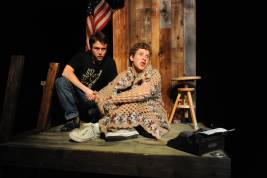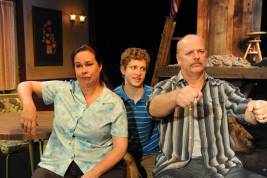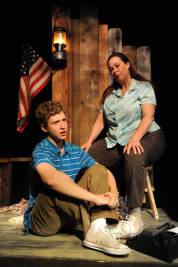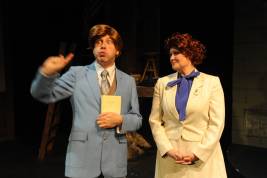
“One of the funniest and most exquisitely written comedy-dramas to come along in a long, long while” is how I described Anita Bryant Died For Your Sins when it had its West Coast Premiere in Los Angeles last year. San Diegans (and Angelinos who want a first or second look at Brian Christopher Williams’ exquisite memory play) would do well to check out its terrific San Diego premiere at Diversionary Theatre under the expert direction of Shana Wride.
“If every man’s life is a story, then the time has come to write mine,” types fifteen-year-old Horace Poore (Dylan Hoffinger) from the tree house where he spends much time coming of age in the late 60s, early 70s. “Like many families, we watched the Vietnam war over Salisbury steak and Kool-Aid,” recalls Horace, his mind going in time back to the summer of 1969. Dad Myron (Don Pugh) works for a construction company, Mom Etta (Dana Hooley) is a factory assembly-liner, and older brother Chaz (Dylan Seaton), the family “fly in the ointment,” has recently been expelled from his second attempt as a high school senior. 1969’s draft lottery is big news across the U.S., and young men ages 18 to 25 unlucky enough to have a draft number under 100 stand zero chance of avoiding being sent to fight in the jungles of Southeast Asia.
To seven-year-old Horace, however, being a “lottery winner” means big bucks. (“Dad plays the lottery. He calls it my college fund.”) Thus, when Chaz’s December 30th birthday is the third to be called, Horace excitedly concludes that “We won!” The news is not nearly so good for the rest of the Poore family, and certainly not for Chaz, who feels his only choice to escape this “stupid war” is an expatriate life in Canada. “It’s not stupid to die for your goddamn country,” retorts his angry, disappointed dad, who believes that his son is running away “like a goddamn sissy coward!” As for Mom, Chad’s hasty departure prompts, in Horace’s words, three weeks of “the great cleaning frenzy of 1969.”
Horace, meanwhile, is doing his best to cope with a growing awareness of his burgeoning sexual identity. The culprit for his dismay (and object of his obsession) is a 19-year-old swimming champ whom young Horace first sees on TV atop the winner’s podium, a “black, sleek, enticing patch of whiskers” above his upper lip. One glimpse of Mark Spitz, and Horace comes to the sudden realization that he has become the unwanted butt of “one of God’s goddamn practical jokes.” “Something has happened to me,” he tells us. “I always knew I was different. Now I know why.”
Three years later, Chaz is still somewhere hiding incommunicado in Canada, Watergate tops the evening news on a daily basis, and Horace is learning to (in his words) “deflect” any time a chance remark—or a song like Johnny Cash’s “A Boy Named Sue”—threatens to call unwanted attention to his budding alternative sexuality. At junior high school, he recounts, “it takes only one day on the playground to realize that it’s the sissy that gets the beating,” and young Horace determines to take up sports. His P.E. teacher turns out to be none other than Mark Spitz look-alike Jake Spencer (Tyler Herdklotz), the hunky older man Horace had earlier spotted showering butt-naked in the gym, and Horace is instantly smitten—alternately elated and terrified by his feelings for the coach. “I can feel a lot of sick days coming up,” he declares.
As the years pass, including Mom’s obsessive redecoration of the house in red, white, and blue in honor of the 1976 Bicentennial, a new reason for Horace to “deflect” emerges in the person of Anita Bryant. Frequent TV appearances by the former Miss America-turned pop singer-turned spokesperson for the Florida Citrus Commission-turned fervent gay rights opponent make Horace feel more conspicuous than ever, and wondering if the people around him can “see it on me.”
And so it goes in Anita Bryant Died For Your Sins, a play I love every bit as much the second time around as the first. The family playwright Williams has created is loving, dysfunctional, apple-pie-American, totally screwed up, and an absolute joy to spend two hours with. Besides writing wholly three-dimensional characters, Williams has quite the way with a quip, as when Horace comments that his parents “never met an expletive they didn’t like,” which Dad immediately follows with, “If I wanted any shit from you, I’d squeeze some from your head.” Delicious!
If you think the Poores will be in any way predictable, think again. One of the joys of Anita Bryant Died For Your Sins is how relentlessly surprising Horace and his family are. Love makes people do foolish (and wonderful) things, and Horace and his family do both, and some pretty terrible ones in between. By the end of the emotional rollercoaster ride that is Anita Bryant Died For Your Sins, no one in the Poore family remains the same as they were at its start, and teenage Horace may very well be on the road to greatness.
A trip down memory lane for Baby Boomers. A history lesson for the under-30s. A timely reminder that the Anita Bryants of the world live on, as strident, misguided, dangerous as they were when Horace Poore was learning to be a man. Anita Bryant Died For You Sins is one of the very best new plays of recent years, its production at Diversionary one of the very best I’ve seen at the nations’ 3rd oldest LGBT theater.
Unlike the Los Angeles production, which had a trio of actors all in their early twenties playing Horace, Chaz, and Jake (superbly by the way), Diversionary has cast actors precisely the ages of the characters they are playing, a gutsy decision since it means hiring an honest-to-goodness teen to play Horace, a role which requires depth, maturity, sensitivity, razor-sharp comic timing, and absolute self-confidence—qualities which 14-going-on-15-year-old Hoffinger possesses in abundance. Cute but never cutesy, charming but never consciously so, Hoffinger has the audience in the palm of his hand from his very first moments in the role and keeps them there, even when Horace turns not quite so sympathetic in Act Two. Hoffinger’s Diversionary debut is one that will be talked about and remembered in years to come.
Matching the real life high schooler every step of the way is a supporting cast which illustrates to perfection the level of talent in San Diego’s vital theater scene (one well worth a look-see by adventurous Angelinos).
Seaton is such a perfect fit for rebellious older brother and so absolutely authentic in the role that one forgets it’s an actor up there on stage. An equally real Herdklotz is sure to bring back audience memories of P.E. teachers of their youth. Having age-appropriate actors as Horace, Chaz, and Jake adds a level of believability that makes scenes between them particularly convincing. It’s easy to understand the envy and hero worship Horace feels for his already adult older brother, and if scenes between an underage Horace and a man clearly two decades his senior can be at times uncomfortable to watch, it’s to the production’s benefit. (It should be noted that there is no sexual activity between the two characters, either shown or implied, though Hoffinger and the audience do catch a brief glimpse of Herdklotz’s bare buns.)
Hooley is a San Diego treasure, brilliant once again as the rough-on-the-outside, fiercely maternal Etta Poore, and Pugh is equally wonderful as big burly Myron, the best darned father a teenage boy could ask for. Both actors create characters who defy stereotypes and our expectations of them. In a small but ultimately pivotal role, Beth Gallagher does fine work as Agnes, the Poore’s “retarded” Polish-American neighbor.
Completing the ensemble are Tony Houck and Jacque Wilke, stealing every scene they’re in in a variety of cameos. Houck’s include a spot-on Walter Cronkite, a goofy classmate of Horace’s, and a flamboyant “heterosexual” preacher with the biggest hair in town. Wilke not only plays an alternately hilarious/scary Anita Bryant, lip-synching to “The Battle Hymn Of The Republic,” but a gawky headgear-wearing teen and several others, similarly well-drawn.
Scenic designer Daniel E. Grodecki II effectively divides the wide Diversionary stage into the Poore kitchen, Horace’s treehouse, a locker room shower, and other assorted locales. Valerie Henderson’s costumes match 1970s fashions with each character’s personality and likely choice of attire. Michelle Caron’s lighting is equally fine, as is Omar Ramos’s sound design, with its selection of nostalgic 1970s hits. Thumbs up too to David Medina’s period properties. Bret Young is production managers, Anthony T. Phifer is stage manager, and Jerusha Lui is dramaturg.
The recent rash of gay teen suicides and the “It Gets Better” campaign they have inspired make it clear that the coming out, coming of age issues raised in Anita Bryant Died For Your Sins are as relevant today as they were thirty-five years ago when Horace Poore was fifteen. Anita Bryant Died For Your Sins gives hope that young Horace, now a happy, fulfilled, out-and-proud survivor of the AIDS epidemic and current battler for marriage and military equality (at least that’s how I choose to see him), would be among those making YouTube videos telling today’s teens that it does indeed get better. It doesn’t get much better than Anita Bryant Died For Your Sins.
Diversionary Theatre, 4545 Park Boulevard, San Diego
www.diversionary.org
–Steven Stanley
October 30, 2010
Photos: Ken Jacques






 Since 2007, Steven Stanley's StageSceneLA.com has spotlighted the best in Southern California theater via reviews, interviews, and its annual StageSceneLA Scenies.
Since 2007, Steven Stanley's StageSceneLA.com has spotlighted the best in Southern California theater via reviews, interviews, and its annual StageSceneLA Scenies.







 COPYRIGHT 2024 STEVEN STANLEY :: DESIGN BY
COPYRIGHT 2024 STEVEN STANLEY :: DESIGN BY